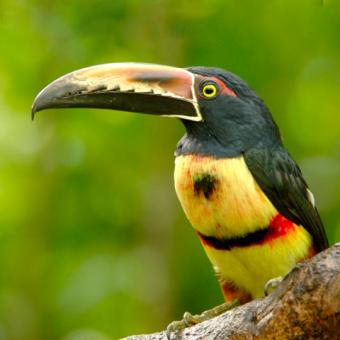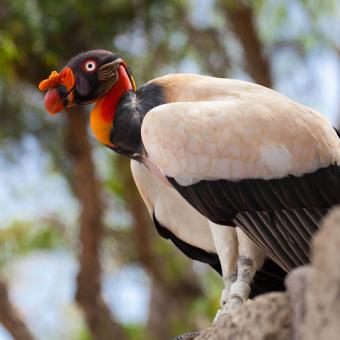Activity Level 3: Moderate
This birding journey spotlights one of the hemisphere’s prime migratory corridors while helping to preserve Important Bird and Biodiversity Areas (IBAs) and support local communities. Your itinerary features 1- to 2-night stays in six locations over 11 days. Daily birdwatching excursions (including nighttime walks) are led by trained local guides, and last from 1–4 hours. Your trails are mainly unpaved but well maintained, with both gradual and steep inclines and some slippery, rocky, or uneven sections. One very strenuous hike to the San Pedro volcano is included, but optional. In the highlands you’ll reach elevations of up to 5,500 feet. Look forward to cultural interaction when you visit local villages, farms, and a school. Highland climate is consistently pleasant, with average daily temperatures in the mid- to upper 60s during the dry season (November–April.) There is one boat ride. Overland transfers last 1–5 hours in private, air-conditioned motorcoaches.
Entry & Exit Requirements
U.S. citizens must have a valid passport to enter Guatemala. Passports must be valid for at least six months past the date of entry and must have at least one blank page. A visa is not required for visits up to 90 days.
If you are not traveling with a U.S. passport, please check with the Guatemalan Embassy for the requirements based on your nationality.
Health Information
IMMUNIZATIONS
The Centers for Disease Control recommends that all travelers be up to date on routine vaccinations such as measles-mumps-rubella (MMR) vaccine, diphtheria-pertussis-tetanus vaccine, varicella (chicken pox) vaccine, and your yearly flu shot before every trip.
There are no vaccinations required for entry into Guatemala, unless you are traveling from (or transiting through) a country where yellow fever transmission is a risk.
Though not required, the CDC recommends vaccination against hepatitis A, hepatitis B, and typhoid for most unvaccinated travelers to Guatemala.
Please consult your physician for additional information and recommendations based on your individual circumstances.
MALARIA
Malaria is caused by a parasite found in Anopheles mosquitos, which are active from dusk until dawn. The CDC advises that travelers to some regions of Guatemala, especially at elevations below 5,000 feet, may be at risk for exposure to malaria. According to the CDC, the risk of malaria is low in Guatemala City, Antigua, and at Lake Atitlán. Nevertheless, travelers should be prepared to take precautions against mosquito bites: Cover exposed skin with lightweight, long-sleeved shirts and pants, consider treating clothes with permethrin, and use an insect repellent containing an active ingredient like DEET or picaridin. If visiting areas with active malaria transmission, consult your physician to determine whether antimalarial medication is recommended.
DENGUE FEVER & OTHER INSECT-BORNE ILLNESSES
Other insect-borne illnesses such as dengue fever, Zika virus, and leishmaniasis are known to occur in Guatemala. Travelers should protect themselves against insect bites using the measures described above.
As a precaution, the CDC advises women who are pregnant to consider postponing travel to any area where Zika virus transmission is ongoing.
After spending time outdoors, especially in grassy or wooded areas, the CDC recommends showering and conducting a full-body check for ticks. If you find a tick attached to your skin, safely remove it as soon as possible.
SUN EXPOSURE
The effects of the sun can be damaging to the eyes and skin. Spending time outdoors exposes you to the sun’s harmful ultraviolet (UV) rays, even on cloudy days. To protect yourself from the sun, use a broad spectrum sunscreen of at least SPF 15, protect skin with clothing, wear a wide-brimmed hat and sunglasses, and drink plenty of fluids.
ALTITUDE SICKNESS
At high elevations (above 5,000 feet), altitude sickness is a possibility. Stay hydrated and well-rested, and avoid heavy, fatty foods and alcohol in the days before arrival. Consult your physician prior to travel for advice specific to your situation.

















